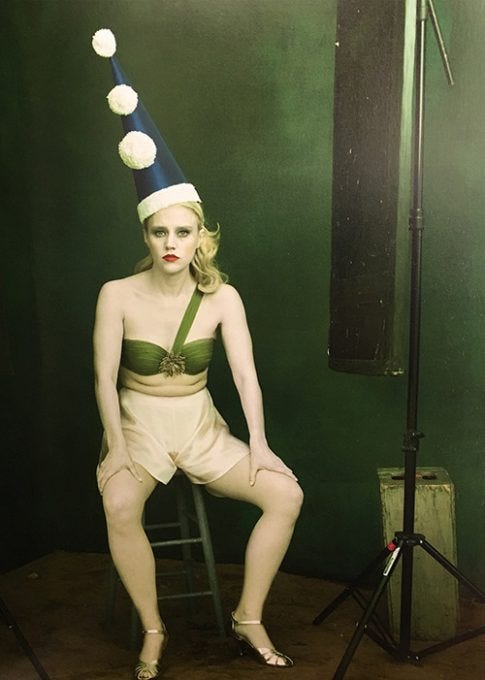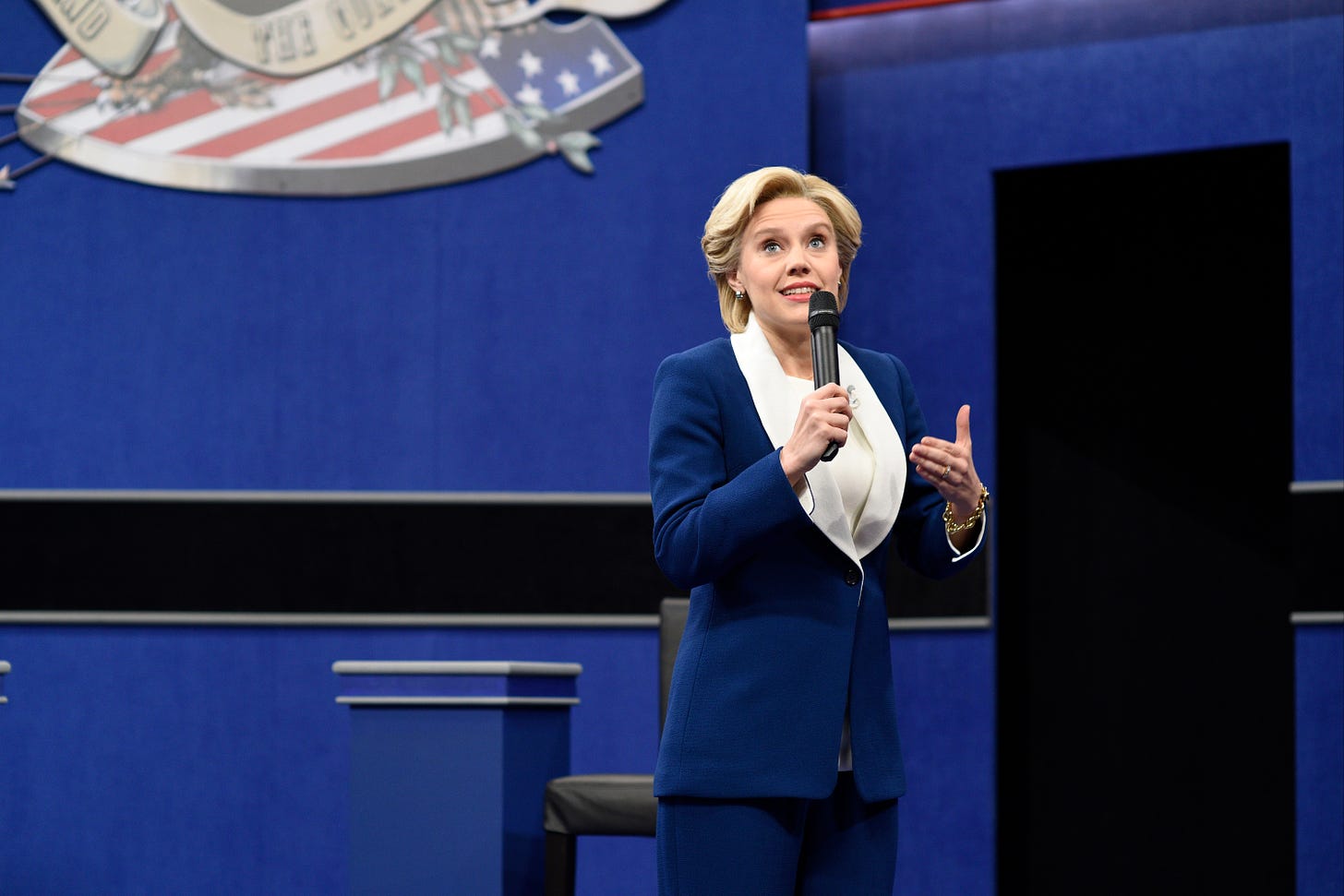Issue 1: Kate McKinnon Didn't Make It Weird
Kate McKinnon didn't have much to say when Vanity Fair came knocking.
Welcome to the first issue of the brand-new version of the Gossip Reading Club! Expect more of the same with a better layout and a more Google-friendly format.
I get asked a lot if I would like to write a celebrity profile one day. It’s certainly something I’ve thought about as a full-time pop culture writer who spends a lot of time discussing the format. I don’t really do a lot of interviews or traditional junket-style stuff for my job. Honestly, I mostly spend my days at my desk (or on the couch) in my pajamas writing hot takes about Batman or Jennifer Lawrence or that weird sweaty rich guy who wants to live forever. I’m keenly aware that there’s a vast difference between what I do and what a Vanity Fair cover story requires. I’m also cognisant of how bloody difficult it actually is to do the latter. I’ve certainly spent enough issues of this here newsletter dissecting how tough it is to write a good profile. Exhibit A: This infamous interview.
Vanity Fair. "The Kate McKinnon Report." September 28, 2017. Lili Anolik.
(Image via Vanity Fair.)
I had been writing professionally for about five months when this Vanity Fair cover story dropped and I remember how utterly baffled we all were by it. We’re talking about thousands of words of word salad lightly peppered with bland replies from its ostensible subject. I remember one friend declaring that it read like an exhausted student trying to pad out an essay 5 hours before it's due, but doing so while hopped up on pixie sticks. Many wondered if it was a joke, or if the journalist was trying to get fired. The actual answer is far duller and more common an issue in this field than often discussed: sometimes, you get nothing and you have to make it work.
Seriously though, this piece goes to some weird places. In describing Kate McKinnon’s impression of Hillary Clinton during the 2016 election season, she says, *deep breath*:
"The loathing between Kate’s Hillary and Alec Baldwin’s Trump is so intense, instinctive, and visceral it’s almost arousing, it’s almost love—you just know the two never stop thinking about each other. She’s his hate interest. (Question: Were we too freaked out and pissed off to notice that the 2016 presidential election was the greatest battle-of-the-sexes screwball farce of the modern era, the blackest romantic comedy of them all? That Clinton and Trump were a surreal, gonzo version of Hepburn and Tracy? Hepburn and Tracy as re-interpreted by David Lynch or Quentin Tarantino? Trump’s nearing the end of his first year as our El Número Uno Commander in Chief and he still can’t shut up about the woman he defeated back in November, gets this wistful look in his eye whenever he calls her by her pet name, Crooked Hillary. It’s as if the old Rodgers and Hart tune were running in his head on a loop. The sleepless nights / The daily fights . . . I wish I were in love again.)"
Uh…
The whole piece is like that, using twenty words when one would suffice and going on more tangents than a toddler with a sugar high. It feels more suited to fiction than a profile, or maybe a wider-reaching cultural conversation that Anolik didn't have the time to fully research. Anolik is a celebrated writer and podcaster with a fizzy, almost fangirlish quality to her work. Her book on the legendary Eve Babitz, Hollywood's Eve, is Anolik at her best, blending biography with personal friendship and an unabashedly feminine agenda to bolster the reputation of a cruelly overlooked icon. Anolik has a gossipy quality that is ideal for certain subjects, like her podcast on Bennington College during the heady years it was dominated by the likes of Donna Tartt and Bret Easton Ellis. It's less well-suited to Kate McKinnon, a warm but cagey comedian who clearly doesn't want to be doing an interview. Then again, what else could she do?
(Image via Flickr: THE 68TH EMMY(r) AWARDS - “The 68th Emmy Awards” broadcasts live from The Microsoft Theater in Los Angeles, Sunday, September 18 (7:00-11:00 p.m. EDT/4:00-8:00 p.m. PDT), on ABC and is hosted by Jimmy Kimmel. (ABC/Image Group LA))
I’ve talked before about how time is one of the biggest limitations of modern celebrity interviewing. A few exceptions aside, we’re long past the days when a journalist would get paid to spend weeks or even months with their subject. Most celebrities don’t need that sort of clout now so why adhere to the demands of a nosy stranger with a microphone asking you about your private life? And when you do give access, there’s a solid chance you won’t like what you see (the last GRC issue was on the New Yorker Jeremy Strong profile, and many people lost their minds over that.) You need to promote your new project and high-visibility magazine covers do a lot of heavy lifting, but you don’t want to turn it into a mental autopsy. So, your publicist lays the ground rules and the publication will almost certainly adhere to them. That’s how we get, for example, Alicia Vikander getting a Vanity Fair cover while only having to do the accompanying interview over Zoom (her being a Louis Vuitton spokesperson probably didn’t hurt given that company’s vast advertising budget in magazines like this.) It’s also how you get a lot of celebrities getting their BFFs to softball them over an actual journalist too.
I’ve no proof of how long Anolik had with Kate McKinnon, but I guarantee you it wasn’t very long. If she got even an hour with her, I’d be stunned. McKinnon, who was still on Saturday Night Live at the time and had recently won an Emmy, is known for maintaining her privacy. The little we do know about her seldom comes from the horse’s mouth (like how she used to date Bari Weiss?!) When she does talk shows and the like, the focus is on the humour, not herself. So, she was never going to be the subject who spills all to Vanity Fair. Anolik seems aware of this and offers an exceedingly padded explanation on her own rules for asking private questions of celebrities ("I’ll only use evidence legally admissible in court, i.e., details or items that the subject has let slip in other interviews, or that have appeared in other reputable publications or forums, i.e., no innuendo or gossip.")
McKinnon remains quiet, but she’s restrained on every topic, not just herself. She doesn’t say much on Clinton "not because she has little else to say but because she gets too overwhelmed to say it." There’s one line from her about her pre-SNL career nestled amid some dense paragraphs by Anolik. It takes until the tenth paragraph (!) for us to get a quote from McKinnon. Everything else is setting the scene and padding it into oblivion. Want to know how many quotes we actually get from the subject of this celebrity profile? Six. Really, six. I counted. Wouldn’t you start rambling like a kid with their hand in the cookie jar if you had to work with six quotes too?
(Image via NBC Universal.)
To Anolik’s credit, she doesn’t get mad at McKinnon for this, nor does she paint her as a bad subject who doesn’t hold up her part of the deal. She spend a lot of words (even by her standards) assuring the reader that McKinnon is lovely, asks her a lot of questions, and seems genuinely interested in the answers. The piece opens by describing journalists interviewing stars as more an "interrogation" than anything else, an inherently artificial process made to seem cutesier and more honest than it truly is. With McKinnon, she says that "her niceness is as pronounced, extreme, and undeniable as her talent."
So, to try and compensate for a quiet subject and lack of time, Anolik tries to pull from the bag of celebrity profile tropes, from detailing how beautiful McKinnon is in a vaguely creepy way ("I’m struck by how much she has to be vain about") to getting friends and colleagues to offer glowing quotes. Anolik even talks about the possibility that the celebrity profile is a relic of the past, an almost quaint throwback to a time before TMZ, email hacks, and Twitter. It's an interesting idea to put your concern over the pointlessness of profiles at the end of a profile many would cite as proof of such things, if nothing else.
We talk a lot about celebrities’ willingness to play the game, and the ever-moving goalposts that are our expectations of their duties. It’s easy to say that we’re more aware of the need for privacy from even our biggest stars but that doesn’t always gel with the always-online nature of the discourse and ceaseless hunger for more. Maybe Harry Styles can retain some control over his personal life but that doesn’t stop the ecosystem of fame from trying to tear it from his hands (or from fans who form parasocial and conspiratorial attachments to the fantasy they’ve formed of his romantic secrets.) When Taffy Brodesser-Akner interviewed Bradley Cooper, she confronted a similar problem to Anolik, but Cooper was more concerned with talking about the work than himself, and Akner delved into the questions over what the interviewer and subject want when they agree to this brief relationship. Those questions still remain. If you’re a celebrity and you want the publicity, what do you have to agree to in order to achieve it? And if you’re the one asking questions, where is your line in the sand over what you can or cannot enquire about?
There are no easy answers. Anolik certainly couldn’t find them but who could? We’ve all been in that situation where you’re unexpectedly short-changed and have to start flinging spaghetti at the wall to see what sticks. Mercifully, most of us don’t have to do it in one of the biggest magazines on the planet.
Thanks for reading! If you liked this, please consider subscribing for more. I’m also going to set up a paid option, which will include posts on everything from the Oscars to books to everything going on in the entertainment world post-strike.
You can find my work on Pajiba.com as well as Slashfilm, IGN, Den of Geek, RogerEbert.com, MUBI, Paste, What to Watch, and anyone who will pay me!








Since the interview part is often short and guarded in these celebrity portraits, the magazines would do well to hire writers who are well versed in the particular popculture the subject works in (comedy, TV drama, superheroes, country music etc) to be able to write interesting stuff about the context at least. Seems as if Anolik was completely out of her depth, when another writer could have done something compelling about the niche McKinnon carved out on SNL, and political comedy in general. That Trump-Clinton part though.... ooof!
I love Kate McKinnon but cmoon, if you agree to an interview, give the journalist something to work with! It takes two to tango